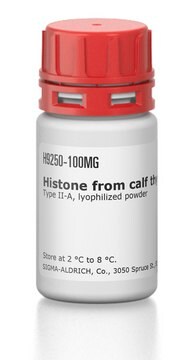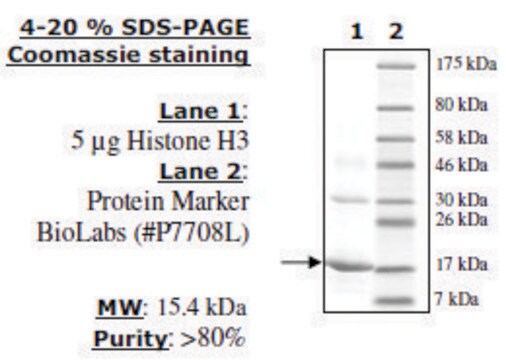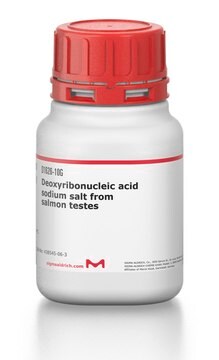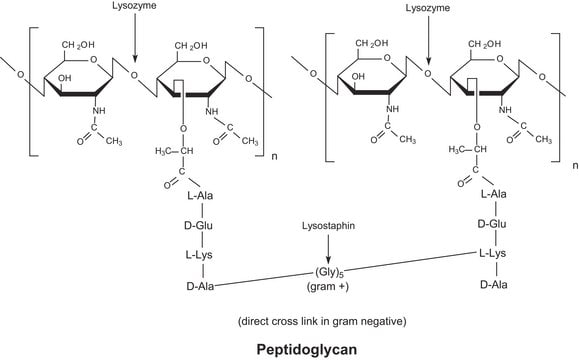Recommended Products
biological source
bovine (calf) thymus
Quality Level
type
Type III-S
form
powder
concentration
≥60% protein (biuret)
technique(s)
activity assay: suitable
solubility
H2O: soluble 10 mg/mL, clear to hazy, colorless to light yellow
storage temp.
2-8°C
Looking for similar products? Visit Product Comparison Guide
Application
Histone is suitable for use:
- as a positive control in the in vitro kinase assay to examine the ability of Cdc2-cyclin B1 to phosphorylate GST-CD-4 protein
- in Cdk5 activity assay
- in histone H1 kinase assay
- as a Poly(ADP-ribose) (PAR) acceptor in the assessment of in vitro PAR polymerase activity
- as an acceptor of 32P from [γ-32P]ATP in order to measure protein kinase activity of lysate from small and large luteal cells
Biochem/physiol Actions
Histones are a group of proteins characterized by high levels of lysine and arginine that form reversible complexes with DNA. Based on the fractions, the molar mass of histones varies between 11-21kDa. Five different fractions have been isolated and characterized. They include H1 (lysine rich), H2a and H2b that are slightly lysine rich, H3 and H4 that are arginine rich. H1 acts as a link between "beads" (nu bodies) on the chromatin chain.
Features and Benefits
Do not confuse Sigma "Type" designations with the "Fraction" designations used by Luck and co-workers.
Other Notes
Characterized as mainly subgroup f1 by SDS-PAGE
Preparation Note
Lysine-rich fraction as isolated and described by de Nooij, E. and Westenbrink, H.G., Biochim. Biophys. Acta, 62, 608 (1962).
Storage Class Code
11 - Combustible Solids
WGK
WGK 3
Flash Point(F)
Not applicable
Flash Point(C)
Not applicable
Personal Protective Equipment
dust mask type N95 (US), Eyeshields, Gloves
Certificates of Analysis (COA)
Search for Certificates of Analysis (COA) by entering the products Lot/Batch Number. Lot and Batch Numbers can be found on a product’s label following the words ‘Lot’ or ‘Batch’.
Already Own This Product?
Find documentation for the products that you have recently purchased in the Document Library.
Customers Also Viewed
Q P Dou et al.
Cancer research, 53(7), 1493-1497 (1993-04-01)
Progression of cells into S phase is proposed to be determined by accumulation of a labile protein (the restriction point protein R; A. B. Pardee, Proc. Natl. Acad. Sci. USA, 71: 1286-1290, 1974). We report here that cyclin E and
Scott T
Concise encyclopedia of biochemistry, 265-265 (1988)
Amit K Dutta et al.
Journal of colloid and interface science, 324(1-2), 55-60 (2008-05-30)
The real-time changes in viscoelasticity of adsorbed poly(L-lysine) (PLL) and adsorbed histone (lysine rich fraction) due to cross-linking by glutaraldehyde and corresponding release of associated water were investigated using a quartz crystal microbalance with dissipation monitoring (QCM-D) and attenuated total
Mária Čížková et al.
Cells, 8(7) (2019-07-20)
DNA damage is a ubiquitous threat endangering DNA integrity in all living organisms. Responses to DNA damage include, among others, induction of DNA repair and blocking of cell cycle progression in order to prevent transmission of damaged DNA to daughter
Wei-Li Zhu et al.
The international journal of neuropsychopharmacology, 15(6), 795-809 (2011-06-21)
Depression is one of the most pervasive and debilitating psychiatric diseases, and the molecular mechanisms underlying the pathophysiology of depression have not been elucidated. Cyclin-dependent kinase 5 (Cdk5) has been implicated in synaptic plasticity underlying learning, memory, and neuropsychiatric disorders.
Our team of scientists has experience in all areas of research including Life Science, Material Science, Chemical Synthesis, Chromatography, Analytical and many others.
Contact Technical Service







